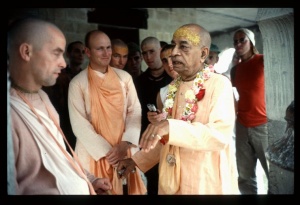SB 10.53.28: Difference between revisions
No edit summary |
(Vanibot #0054 edit - transform synonyms into clickable links, which search similar occurrences) |
||
| Line 23: | Line 23: | ||
<div class="synonyms"> | <div class="synonyms"> | ||
''atha'' | ''[//vanipedia.org/wiki/Special:VaniSearch?s=atha&tab=syno_o&ds=1 atha]'' — then; ''[//vanipedia.org/wiki/Special:VaniSearch?s=kṛṣṇa&tab=syno_o&ds=1 kṛṣṇa]-[//vanipedia.org/wiki/Special:VaniSearch?s=vinirdiṣṭaḥ&tab=syno_o&ds=1 vinirdiṣṭaḥ]'' — ordered by Lord Kṛṣṇa; ''[//vanipedia.org/wiki/Special:VaniSearch?s=saḥ&tab=syno_o&ds=1 saḥ]'' — that; ''[//vanipedia.org/wiki/Special:VaniSearch?s=eva&tab=syno_o&ds=1 eva]'' — very; ''[//vanipedia.org/wiki/Special:VaniSearch?s=dvija&tab=syno_o&ds=1 dvija]'' — of learned ''brāhmaṇas''; ''[//vanipedia.org/wiki/Special:VaniSearch?s=sat&tab=syno_o&ds=1 sat]-[//vanipedia.org/wiki/Special:VaniSearch?s=tamaḥ&tab=syno_o&ds=1 tamaḥ]'' — the most pure; ''[//vanipedia.org/wiki/Special:VaniSearch?s=antaḥ&tab=syno_o&ds=1 antaḥ]-[//vanipedia.org/wiki/Special:VaniSearch?s=pura&tab=syno_o&ds=1 pura]'' — within the inner palace; ''[//vanipedia.org/wiki/Special:VaniSearch?s=carīm&tab=syno_o&ds=1 carīm]'' — staying; ''[//vanipedia.org/wiki/Special:VaniSearch?s=devīm&tab=syno_o&ds=1 devīm]'' — the goddess, Rukmiṇī; ''[//vanipedia.org/wiki/Special:VaniSearch?s=rāja&tab=syno_o&ds=1 rāja]'' — of the king; ''[//vanipedia.org/wiki/Special:VaniSearch?s=putrīm&tab=syno_o&ds=1 putrīm]'' — the daughter; ''[//vanipedia.org/wiki/Special:VaniSearch?s=dadarśa&tab=syno_o&ds=1 dadarśa] [//vanipedia.org/wiki/Special:VaniSearch?s=ha&tab=syno_o&ds=1 ha]'' — saw. | ||
</div> | </div> | ||
Latest revision as of 19:24, 17 February 2024

A.C. Bhaktivedanta Swami Prabhupada
Please note: The synonyms, translation and purport of this verse were composed by disciples of Śrīla Prabhupāda
TEXT 28
- atha kṛṣṇa-vinirdiṣṭaḥ
- sa eva dvija-sattamaḥ
- antaḥpura-carīṁ devīṁ
- rāja-putrīm dadarśa ha
SYNONYMS
atha — then; kṛṣṇa-vinirdiṣṭaḥ — ordered by Lord Kṛṣṇa; saḥ — that; eva — very; dvija — of learned brāhmaṇas; sat-tamaḥ — the most pure; antaḥ-pura — within the inner palace; carīm — staying; devīm — the goddess, Rukmiṇī; rāja — of the king; putrīm — the daughter; dadarśa ha — saw.
Translation and purport composed by disciples of Śrīla Prabhupāda
TRANSLATION
Just then the purest of learned brāhmaṇas, following Kṛṣṇa's order, came to see the divine Princess Rukmiṇī within the inner chambers of the palace.
PURPORT
According to Śrīla Śrīdhara Svāmī, Śrī Kṛṣṇa had reached the gardens outside the city, and out of concern for Rukmiṇī He had instructed the brāhmaṇa to tell her of His arrival.